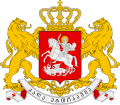Parts of this article (those related to 2024 Georgian post-election protests) need to be updated.(December 2024) |
 | |
Georgia | Lithuania |
|---|---|
| Diplomatic mission | |
| Embassy of Georgia, Vilnius | Embassy of Lithuania, Tbilisi |
Georgia-Lithuania relations refers to bilateral relations between Georgia and Lithuania. Lithuania is a member of the EU, which Georgia applied for in 2022. Both nations are members of the Council of Europe. Both countries are Post Soviet states as they were Republics of the Soviet Union. Georgia has an embassy in Vilnius. Lithuania has an embassy in Tbilisi.


